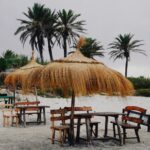Introduction to Tunisia
Tunisia, a North African gem, offers a captivating blend of Mediterranean charm, Saharan adventures, and rich cultural heritage. Whether you’re relocating, visiting for work, or exploring as a tourist, this guide will help you navigate Tunisia’s landscapes, traditions, and daily life seamlessly.
Tunisia is a small yet diverse country located between Algeria and Libya, with a stunning Mediterranean coastline. Known for its ancient ruins, bustling souks, and golden deserts, Tunisia is a melting pot of Arab, Berber, French, and Mediterranean influences.
Why Tunisia?
- Affordable Living: Lower cost of living compared to Europe.
- Rich History: Home to UNESCO World Heritage Sites like Carthage and the Medina of Tunis.
- Diverse Landscapes: From Mediterranean beaches to the Sahara Desert.
- Warm Hospitality: Tunisians are known for their friendliness.
1. Understanding Tunisian Culture & Etiquette
Language & Communication
- Official Language: Arabic (Tunisian dialect).
- Widely Spoken: French (especially in business and urban areas).
- Basic Phrases:
- Marhaba (Hello)
- Shukran (Thank you)
- Labes? (How are you?)
Social Etiquette
- Greetings: Handshakes are common; close friends may kiss cheeks.
- Dress Code: Modest clothing is appreciated, especially in rural areas.
- Hospitality: Accepting tea or coffee is a sign of respect.
2. Best Places to Live & Visit in Tunisia
Tunis (The Capital)
- Pros: Vibrant culture, job opportunities, modern amenities.
- Must-Visit: The Bardo Museum, Carthage ruins, Sidi Bou Said.
Sousse & Hammamet (Coastal Cities)
- Pros: Beautiful beaches, tourist-friendly, relaxed lifestyle.
- Must-Visit: Medina of Sousse, Yasmine Hammamet.
Djerba (Island Paradise)
- Pros: Stunning resorts, multicultural history (Jewish & Muslim heritage).
- Must-Visit: El Ghriba Synagogue, Houmt Souk.
Tozeur & Douz (Desert Adventures)
- Pros: Gateway to the Sahara, unique landscapes.
- Must-Visit: Chott el Jerid, Star Wars filming locations.
3. Cost of Living in Tunisia
Tunisia is budget-friendly for expats and digital nomads.
Monthly Expenses (Approx.)
- Rent (1-bedroom apartment in Tunis): $250–$500
- Utilities (Electricity, Water, Internet): $80–$150
- Groceries: $150–$300
- Dining Out: $5–$15 per meal
4. Transportation & Getting Around
Public Transport
- TGM Train: Connects Tunis to northern suburbs.
- Metro (Light Rail): Affordable way to travel in Tunis.
- Louages (Shared Taxis): Fast and economical for intercity travel.
Driving in Tunisia
- Road Conditions: Generally good, but chaotic in cities.
- Car Rentals: Available for tourists (around $30–$50/day).
5. Tunisian Cuisine: Must-Try Dishes
Tunisian food is flavorful and diverse, influenced by Mediterranean and Arabic traditions.
Top Dishes to Try
- Couscous: National dish, often served with lamb or fish.
- Brik: Crispy pastry filled with egg and tuna.
- Lablabi: Chickpea soup, perfect for breakfast.
- Harissa: Spicy chili paste used in many dishes.
6. Safety & Health Considerations
Safety Tips
- General Safety: Tunisia is safe, but petty theft can occur in tourist areas.
- Travel Advisories: Check government updates before visiting border regions.
Healthcare
- Public Hospitals: Affordable but basic.
- Private Clinics: Higher quality (e.g., Clinique Les Oliviers in Tunis).
- Health Insurance: Recommended for expats.
7. Working & Doing Business in Tunisia
Job Market
- Key Industries: Tourism, IT, textiles, agriculture.
- Work Permits: Required for non-Tunisians (sponsored by employer).
Starting a Business
- Ease of Doing Business: Moderate (bureaucracy can be slow).
- Popular Sectors: Tech startups, export businesses.
8. Visa & Residency Requirements
Tourist Visa
- Visa-Free: Many nationalities (EU, US, UK) get 90-day entry.
Long-Term Stays
- Work Visa: Requires employment contract.
- Residency Permit: Renewable annually.
9. Leisure & Entertainment in Tunisia
Beaches & Resorts
- Best Beaches: Hammamet, Djerba, Sousse.
Cultural Experiences
- Festivals: Carthage International Festival, Sahara Festival in Douz.
- Shopping: Souks for handicrafts, ceramics, and spices.
Nightlife
- Tunis & Sousse: Bars, clubs, and live music.
- Djerba: Beach parties and luxury resorts.
10. Challenges & How to Overcome Them
Language Barrier
- Solution: Learn basic Arabic/French phrases.
Bureaucracy
- Solution: Hire a local facilitator for paperwork.
Cultural Adjustments
- Solution: Engage with locals and expat communities.
Conclusion: Embracing Life in Tunisia
Tunisia offers an enriching experience for newcomers with its affordability, cultural depth, and stunning landscapes. By understanding local customs, exploring key cities, and embracing the laid-back Mediterranean lifestyle, you’ll find Tunisia a rewarding place to live or visit.
Final Tips for Newcomers
✔ Learn basic Arabic/French.
✔ Explore beyond tourist spots.
✔ Respect local traditions.
✔ Stay connected with expat groups.
Whether you’re sipping mint tea in a Tunisian café or riding a camel in the Sahara, Tunisia promises unforgettable memories. Welcome to your new adventure!


